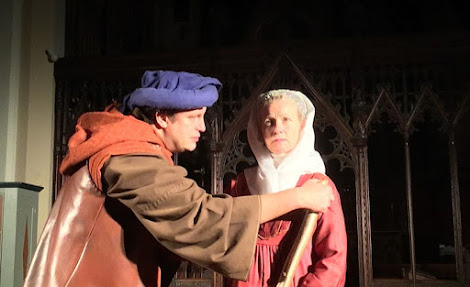Theatre: Scenes
from the Medieval Mystery Plays (The York Cycle) by the Players of St
Peter (St Saviour’s, Chalk Farm)
CHURCH
TIMES, 31 DECEMBER 2021
Garry Humphreys sees a production by The
Players of St Peter in a parish church
IT IS a pleasure to report that the
Mystery play is alive and well — and not only in Ambridge. The Players of St
Peter, who began life 75 years ago at St Peter’s, Cornhill, in the City of
London, have had various locations over the years, but are now based at St
Saviour’s, Chalk Farm, in north-west London, where they presented four
performances of this year’s offering, a “director’s cut” featuring four of the
48 plays in the York Cycle, which, complete, depicts biblical events from
creation to the last judgement.
These plays — originally sponsored by
craft guilds whose names live on in the titles — were The Spicers’ Play (The
Annunciation and Visitation), The Pewterers’ and Founders’ Play (Joseph’s
Trouble about Mary), The Tile Thatchers’ Play (The Nativity),
and The Masons’ and Goldsmiths’ Play (The Magi).
The group’s long tradition clearly
shows in the ease with which roles were dispatched: serene Mary, benign
Gabriel, Joseph not easily convinced that his wife’s baby had come from God
(“Nay, some man in angel’s likeness with some game has her beguiled”), the
Magi, one of whom was a woman; and minor characters, no doubt thanks to Gill Taylor’s
expert direction, fully engaged with the action — the expressive ox and ass,
the kings’ servant shaking his arm back to life after carrying the heavy box of
gifts; the star held high on a pole, all this often reminiscent of
Shakespeare’s rustics in A Midsummer Night’s Dream.
The music — with solo soprano,
recorders, violin, cittern and percussion — was immaculately played by The
Mystery Band, with the singer Helen Garrison, and at a small pipe organ was
Paul Nicholson, former associate director of the London Handel and Tilford Bach
Festivals, whom St Saviour’s is so fortunate now to have as its Vicar. But the
actors sang, too (rather well), in impressive costumes, and we all stood to
join in The Sussex Carol at the end.
It seems to me that Mystery plays — in
the 15th and 16th centuries the most popular and enduring form of public
entertainment in Britain, before theatres as we now know them came to be built
— could at Christmas come to rival the traditional pantomime for good family
entertainment, accentuating the true meaning of Christmas in a now largely
secular (and, in the case of the pantomime, celebrity-obsessed) world.
Perhaps The Archers, doing this very thing, will draw wider
attention to this wonderful, often funny, frequently moving genre, and to
groups such as The Players of St Peter, who do it so splendidly.
